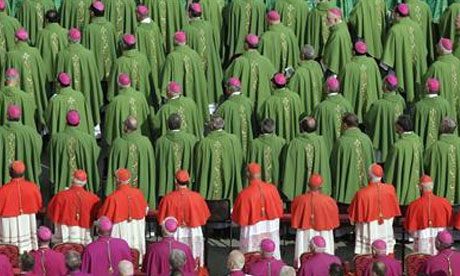Pope Benedict XVI opened the Synod of Bishops on Sunday by urging prelates from around the world to try to bring back Catholics who have left the church through an evangelization mission.
Some 262 cardinals, bishops and priests gathered in Rome for the meeting, or synod, called to give impetus to the pope’s efforts to re-evangelize parts of the world where Catholicism has fallen by the wayside.
The pope said that to evangelize means to help people understand that God himself has responded to their questions, and that his response – the gift of salvation in Jesus Christ – is available to them as well.
“Our role in the new evangelization is to cooperate with God,” the pope said. “We can only let people know what God has done.”
At the start of the Mass on Sunday, Pope Benedict named two new “doctors” of the church, conferring one of the Catholic Church’s highest honors on the 16th-century Spanish preacher, St. John of Avila, and the 12th-century German mystic, St. Hildegard of Bingen.
Cardinal Angelo Amato read aloud the reasons why the church was proclaiming St. John and St. Hildegard doctors, saying their “holiness and eminent doctrine” shine hundreds of years after they lived.
Pope Benedict is particularly fond of Hildegard, who was considered a saint in his native Germany but was never officially proclaimed one by the Vatican. Benedict, who himself referred to Hildegard as a saint, earlier this year passed the decree making her one officially, a requirement for her to be named a church doctor.
The last church doctor named was St. Therese of Lisieux, France, in 1997. The first church doctors were Sts. Ambrose, Augustine, Jerome and Gregory the Great.
The pope has long lamented that in Europe and the Americas, Catholics no longer practice their faith or pass it onto their children. That concern is reflected in the synod’s working document that will form the basis of discussion over the next three weeks, a report by the Associated Press said.
“There is a clear link between the crisis in faith and the crisis in marriage,” the pope said.
The so-called “new evangelization” is a top priority for Pope Benedict, who routinely laments how cultures in Europe and the West that were once profoundly Christian have become increasingly secular.
The synod coincides with the 50th anniversary of the start of the Second Vatican Council, the 1962-65 church meetings that modernized the church.
Cardinal Donald Wuerl, the archbishop of Washington, was named by Benedict to run the meeting.
During the opening of the synod, Pope Benedict spoke of the importance of prayer in the church’s push for a new evangelization, the meaning of evangelization, and sharing the Gospel through both proclamation and charity.
The pope examined the use of the word “evangelion,” the Greek term that is the root of the English word “evangelization,” and which is itself translated as “Gospel.”
During his homily, Pope Benedict said that the “church exists to evangelize” by sharing the Gospel with people who have never heard of Christ, strengthening the faith of those who already have been baptized and reaching out to those who “have drifted away from the church.”
“At various times in history,” he said, “divine providence has given birth to a renewed dynamism in the church’s evangelizing activity,” as happened, for example, with the evangelization of the Americas beginning late in the 15th century.
“Even in our own times, the Holy Spirit has nurtured in the church a new effort to announce the good news,” the pope said.
The pope said the synod is dedicated to helping people strengthen their faith and to helping those who have drifted away “encounter the Lord, who alone who fills existence with deep meaning and peace; and to favor the rediscovery of the faith, that source of grace which brings joy and hope to personal, family and social life.”
Sources
